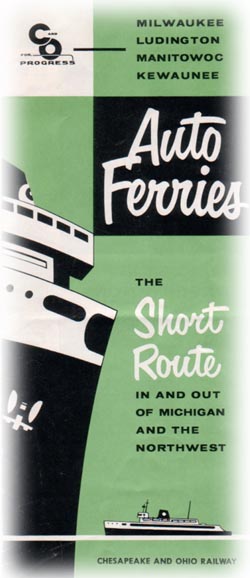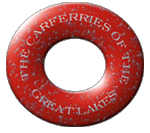


It was a warm Indian summer day in late October of the year 1969 when my adventure and love affair with the Car Ferries began.
While employed as a wiper on the Diamond Alkali, I got off the boat with the chief engineers blessing to tip a few brews in downtown Muskegon,
Michigan. We were in port to unload coal and our next stop was to be
Manistee, Michigan to take on sand for the lower lakes. The chief told me
to have fun and catch the boat in Manistee, which was a short bus ride from
Muskegon. The boats orders were changed and it didn’t go to Manistee. I
was stranded, my gear was on the boat and I had very little money in my pocket. I caught the Bus to Manistee.
As it was late October in Michigan the days were warm but the nights were
cold and I about froze my bippy off. I was penniless with nowhere to stay
and couldn't wire home for money until the next day.
My grandfather told me if that ever happened to me that I should just go to the local jail and they would put me up over night.(He was a hobo during the
Depression) Yeah Right! They informed me that they would be glad to
charge me with vagrancy and give me a 30 day stint in the County Poky! I
passed on that offer!!!
I spent the night sleeping in the a public restroom because it was the only heated place I could find. In the morning I called my wife in Davenport, Iowa and she wired me the money to get home. All of my gear was still on
the Diamond Alkali but the Captain fired me. A week later I retrieved my
gear off of that ship in Ludington, Michigan.
I stayed overnight in Ludington and the following morning while waiting for the bus just happened to walk by the National Maritime Union office which
proclaimed boldly and , exactly, Max Sylkowski “In Charge”. A truer
statement was never written.
I talked to Max after waiting in the Union Office all morning. He would
call me back to “His” portion of the office which was situated in a little portal off of the main office and talk to me for a bit and then just as suddenly tell me to go sit down and he would think about whether he wanted
to give me a referral to the C & O Car Ferries. It was the strangest of
many experiences that I had as a merchant seaman.
Finally, Max told me that he didn’t think he would send me down to the office that day. At that point, I told him what I thought of him in a
string of four letter expletives and stormed out of his office. I thought
that was the end of it, but Max came running after me and told me that he had my referral slip all made out for a Coalpassers job and was sending me down to the office.
By the end of the day I was hired as the 8 to 12 coalpasser on the Badger.
It was the beginning of not just a job but being a part of a real family of mostly men, but a few women too. The few women employed worked in the housekeeping department on the boat. The men I worked with over the next few years were a great bunch of guys and it was a real fraternity.
As many of you know the Engine Room crews sleep in what is referred to as the flicker,(the name is derived from the direct current lights which were employed on the older boats in the early years) which is located below decks with no views to the outside world. It is directly adjacent to the Engine Room which is accessed by going up one ladder, squeezing between a string of Boxcars for a short distance and then going down another ladder into the engine room.
The Coalpassers job was as easy a job as I have ever performed. It was a
dirty and strenuous job but all of your work was completed within an hour and a half—at the most. The work consisted of running coal to the stokers through the means of a conveyor belt and when finished with that pulling the ashes from the boilers and shooting them over the side with the steam powered ash gun.(located in front of the boiler and under the deck plates.
Then it was time for coffee break and you would head for the Galley where
the men gathered to talk—and talk they did about all manner of subjects. I
lived for those conversations as it was how we learned about each other.
Lifetimes were crammed into 20 day stints.
The coalpasser then returned to the Firehold, to relieve the fireman for his break and then (under most chiefs-not all)was free to do as he pleased.
(talk about feather bedding!!!)
Finally, I will never forget the men that I met during those years. There
was Fred Byrd, a retired school teacher who was my fireman, Shorty Lawson
a watertender and drinking buddy. There was Snaky Jake(last name
unknown)who claimed to be an expert at everything. We enjoyed playing
practical jokes on him. Everyone in that engine room crew had a
nickname-mine was “Physical Fitness” I used to do my excercise in the
flicker and run a couple of miles a day on whichever side I could.
I later worked as a fireman, watertender and oiler on all the ships but the
41 and the 32 which was defunct but still in Ludington when I started there.
I don't know why but I never liked the Spartan. I did like the 31, a
turbo electric power plant and both of the 20’s were great as well.
“Senator” Bill Lucas, a nice man and tireless worker, was the regular 12
to 4 fireman on the Badger and the engine room delegate. I would venture to exclaim that we still hold the record for pulling six pans of ashes in 17
minutes. If anyone knows of a faster time for that feat-let me know. We
used to have a running contest among the different watches to see who could
get the job done the quickest. I was proud to have Bill as my friend. I
haven’t seen Bill for many years but plan to look him up again. Hopefully,
he is still alive.
This is only a brief synopsis of my time on the Car Ferries and it is a time
which I hold dear and precious. I have worked at many different jobs from
day laborer, Lab Technician, Foreman and Flight Instructor - Charter Pilot, but none of them would ever equal my time on the C & O car ferries .
It wasn’t just a job but a family of men. We cared for each other and
were friends. Like seamen everywhere we couldn’t wait for our 8 days off to begin, but were glad to get back to work at the end of that time.
Bob Swanson
 Back to
the Main Page
Back to
the Main Page